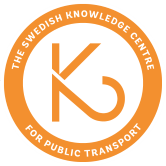In rural areas with low demand, demand responsive transport (DRT) can provide an alternative to the regular public transport bus lines, which are expensive to operate in such conditions. With simulation, we explore the potential effects of introducing a DRT service that replaces existing bus lines in Lolland municipality in Denmark, assuming that the existing demand remains unchanged. We set up the DRT service in such a way that its service quality (in terms of waiting time and invehicle time) is comparable to the replaced buses. The results show that a DRT service can be more cost efficient than regular buses and can produce significantly less CO2 emissions when the demand level is low. Additionally, we analyse the demand density at which regular buses become more cost efficient and explore how the target service quality of a DRT service can affect operational characteristics. Overall, we argue that DRT could be a more sustainable mode of public transport in low demand areas.
